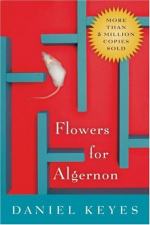|
|
Flowers for Algernon Progress Report 14
Newspapers seize upon the sensational story of Charlie's flight from the convention. Charlie stumbles across a background article on his own family, accompanied by a jarring photograph of his mother and sister. The picture reminds Charlie of the night his frustrated mother decided to send him away to the Warren State Home for Norma's protection.
Charlie moves into a new apartment and meets his strange next-door neighbor, a free-spirited artist named Fay Lillman. Locked out of his apartment, Charlie hopes to use Fay's fire escape to access his own window. The flirtatious and half-naked painter invites him in and, surrounded by her mess, they quickly become friends. After a few drinks, Fay follows Charlie across the fire escape and back into his own orderly apartment. Fay discovers a three-dimensional plastic maze that Charlie constructed for Algernon's routine exercise. Charlie finds his nutty and vivacious neighbor very attractive.
Acting on information gathered from the newspaper article, Charlie finds his father's barber shop in the Bronx and pays him a visit. Charlie remembers his father warmly, for Matt Gordon had always accepted Charlie, unlike his mother. Instead of revealing his identity, Charlie enters Gordon's Barber Shop as a regular customer. Sitting in the barber's chair, Charlie's thoughts return to the tumultuous night when his mother decided to send him away. Rose Gordon hysterically threatened to attack young Charlie with a knife unless Matt took him immediately to the Warren State Home. When the haircut, shave, and suntan are finished, Charlie waits expectantly for Matt to recognize him. Charlie feels ill, almost forgets to pay his bill, and leaves the shop without revealing his true identity.
Back in his apartment, Charlie worries that Algernon's behavior has become erratic. Fay brings Algernon a female companion, a small white mouse named Minnie. Following Fay's sexual advances, the neighbors drink gin and spend the night together. When he becomes intoxicated, however, Charlie's old self resurfaces; he became confused and childlike, to Fay's delight. Charlie writes, the old Charlie Gordon was still there. "Nothing in our minds is ever really gone. The operation had covered him over with a veneer of education and culture, but emotionally he was there--watching and waiting." PR 14, pg. 136
Charlie roams the streets at night and goes into movie theaters, craving human interaction. At a diner, a retarded busboy drops a tray full of dishes, and the entire restaurant laughs at his distress. In an embarrassing outburst, Charlie tells the patrons to shut up and stop laughing; the busboy is a human being just like anyone else.
Feelings of compassion inspire Charlie to return to work on the project, hopeful to help millions of people. Charlie contacts Alice Kinnian and explains his search for emotional, not just intellectual, maturity. Alice and Charlie rekindle their romance, yet his subconscious will not allow him to make love to her. Starved for human contact, Charlie returns home and is finally able to overcome his impotence with Fay. Although he does not love Fay, Charlie's sexual relationship with the free-spirited artist is exciting and important to him.
Algernon's raving behavior becomes more serious as he bites Fay and injures Minnie. Charlie knows that he must take the mouse back to the lab and he resolves to start working with the Foundation again.




